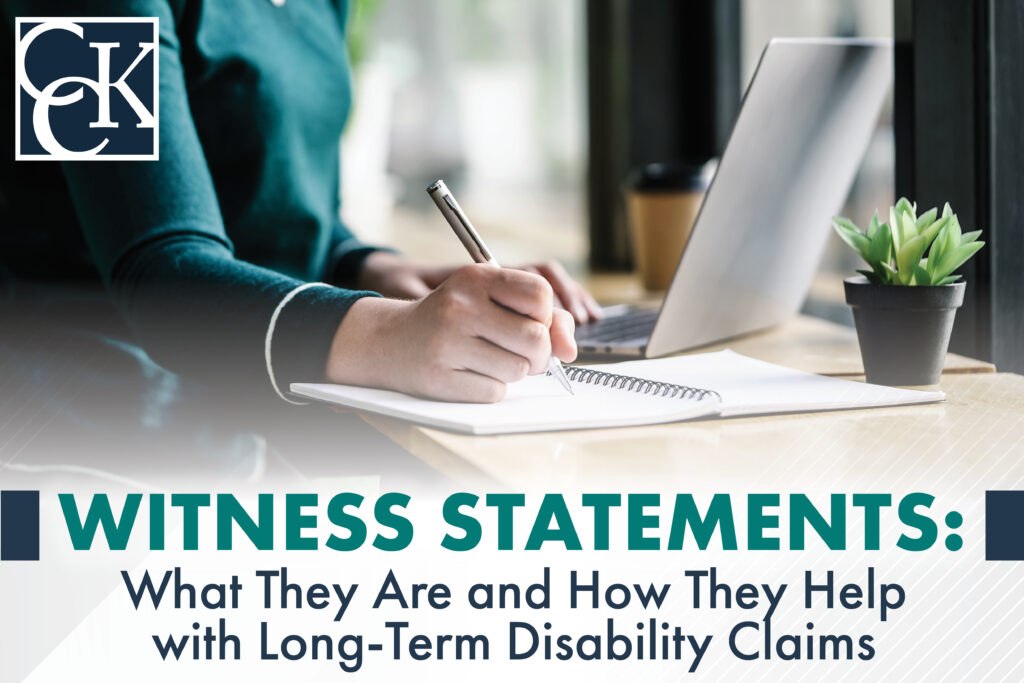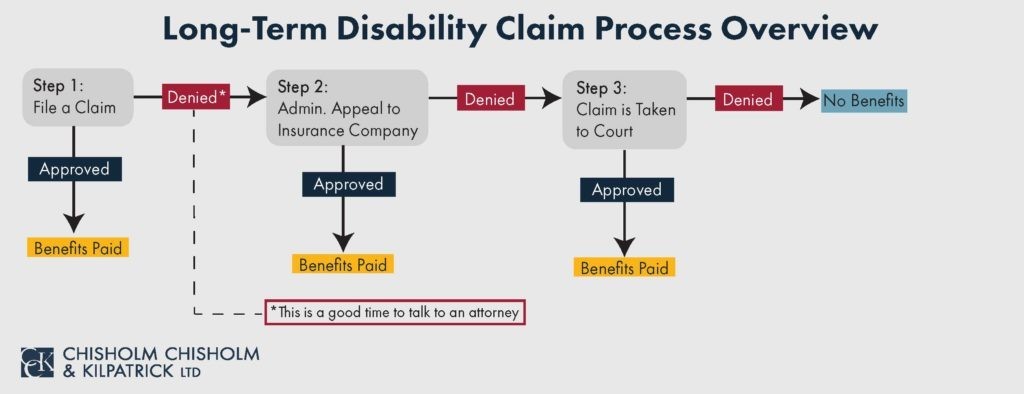Witness Statements: What They Are and How They Help with Long-Term Disability Claims

Suffering from a medical condition can sometimes make it difficult to work. If you have a long-term disability (LTD) policy, filing a claim for benefits may become necessary. These benefits can help support you and your family if your medical condition inhibits your ability to work. Claimants often submit their medical records to prove their disability to the insurance company, but these records are sometimes insufficient to win a claim.
Witness statements can supplement such medical records and help bolster a claim, especially when a claimant’s disabling condition is not easily established by diagnostic tests or exams, such as in the case of chronic pain or fatigue.
This article will explore what exactly a witness statement is, who can write these statements, and how they can help a person with their LTD claim.
What is a Witness Statement?
Collecting evidence is a vital part of the long-term disability claim process. As mentioned, medical records are a primary source of evidence for claimants. Some claims may win an approval with only their medical records submitted as evidence, but this is not the case for everyone. Other claimants may find that to prove their condition meets their policy’s definition of disability, they must submit supplemental evidence.

Witness statements are one form of supplemental evidence. They are written by those people who have witnessed how the claimant’s medical condition specifically impacts the claimant. For example, a spouse, close friend, or coworker may write such a statement.
Regardless of who writes the witness statement, it should be written by someone who knows the claimant well, preferably for an extended period. This close relationship helps provide credibility to the statement.
What Should a Witness Statement Contain?
For a witness statement to be successful, it must contain certain elements. These elements, when well-written, can provide insight into your condition and how it affects you. In short, such a letter can help illustrate the necessity of long-term disability benefits.
A witness statement in support of an LTD claim or appeal should include the following elements:
- The witness’ information: This includes their name, relation to the claimant, how long they have known the claimant, and how often they see the claimant.
- Physical issues the claimant has: A witness can explain the physical issues the claimant is experiencing, such as difficulty walking or trouble sitting for extended periods.
- Memory or concentration issues the claimant has: The witness may see whether the claimant has had memory or concentration issues, such as needing to write things down or having difficulty sustaining a conversation.
- How the disability is progressing: In other words, is the disability getting worse? The witness should mention what specific signs show that it is getting worse.
- Activities the claimant can no longer do: Witnesses can provide their observations of claimants not being able to do activities they were able to do before their disability began. They can also include how often the claimant must rest or how the claimant interacts with others.
Whoever is writing the witness statement should write what they have seen themselves, not what they have been told. For example, if the claimant tells the witness that their doctor told them they could not drive to work, the witness should not include this within their letter. The insurance company may not put much credibility in such a letter since the person did not hear the doctor say this themselves.
Instead, if the witness sees that the claimant cannot drive themselves to work, then they can include that information because they have firsthand knowledge of the issue.
Why Are Witness Statements Sometimes Necessary for Long-Term Disability Claims?
As mentioned, not all claimants will need to submit witness statements as part of their LTD claim. However, some claimants may suffer from conditions that do not have diagnostic tests and rely more on the claimant’s self-reporting of symptoms.

For example, lupus, a debilitating condition that can warrant long-term disability benefits, does not have a diagnostic test. Instead, doctors rely on ruling out other conditions first and then monitoring the claimant’s current symptoms to diagnose the condition.
If a claimant suffers from lupus, then they may benefit from submitting a witness statement. Other conditions, such as chronic pain, depression, and insomnia can also benefit from such statements.
However, even if a condition does have a diagnostic test or other objective medical evidence associated with it, it is still a good idea to submit a witness statement as part of your claim.
The insurance company may deny an initial long-term disability claim. Fortunately, all claimants have the right to file an appeal. If they did not include a witness statement with their initial claim, then it is advantageous to submit one as part of their appeal.
If the insurance company still denies their claim after filing an appeal, then, under ERISA, they may file a lawsuit in federal court. During ERISA litigation, the court will typically look at whatever evidence is already in the claim file from the administrative appeal, which would include witness statements. Since a claimant cannot introduce witness testimony during litigation, these statements can be important to reinforce the claim.
Chisholm Chisholm & Kilpatrick Can Help Collect and Submit Evidence for Your LTD Claim
When you file for long-term disability benefits, it can be overwhelming. There are claimant forms to submit, deadlines to be cognizant of, and more. Collecting evidence, such as specialized reports from your doctor, witness statements, and vocational evaluations can be daunting. Managing a medical condition and filing for benefits can become too much.
However, you do not have to go through this process on your own. Our team at Chisholm Chisholm & Kilpatrick understands how difficult all this is and wants to help. We can help you collect evidence that reinforces your claim, including the witness statements. Moreover, we can submit all evidence on your behalf to ensure that your claim satisfies all filing deadlines.
Call CCK today at (800) 544-9144 for a free case evaluation with a member of our team. We will evaluate your case and determine if we can help.
About the Author
Share this Post

